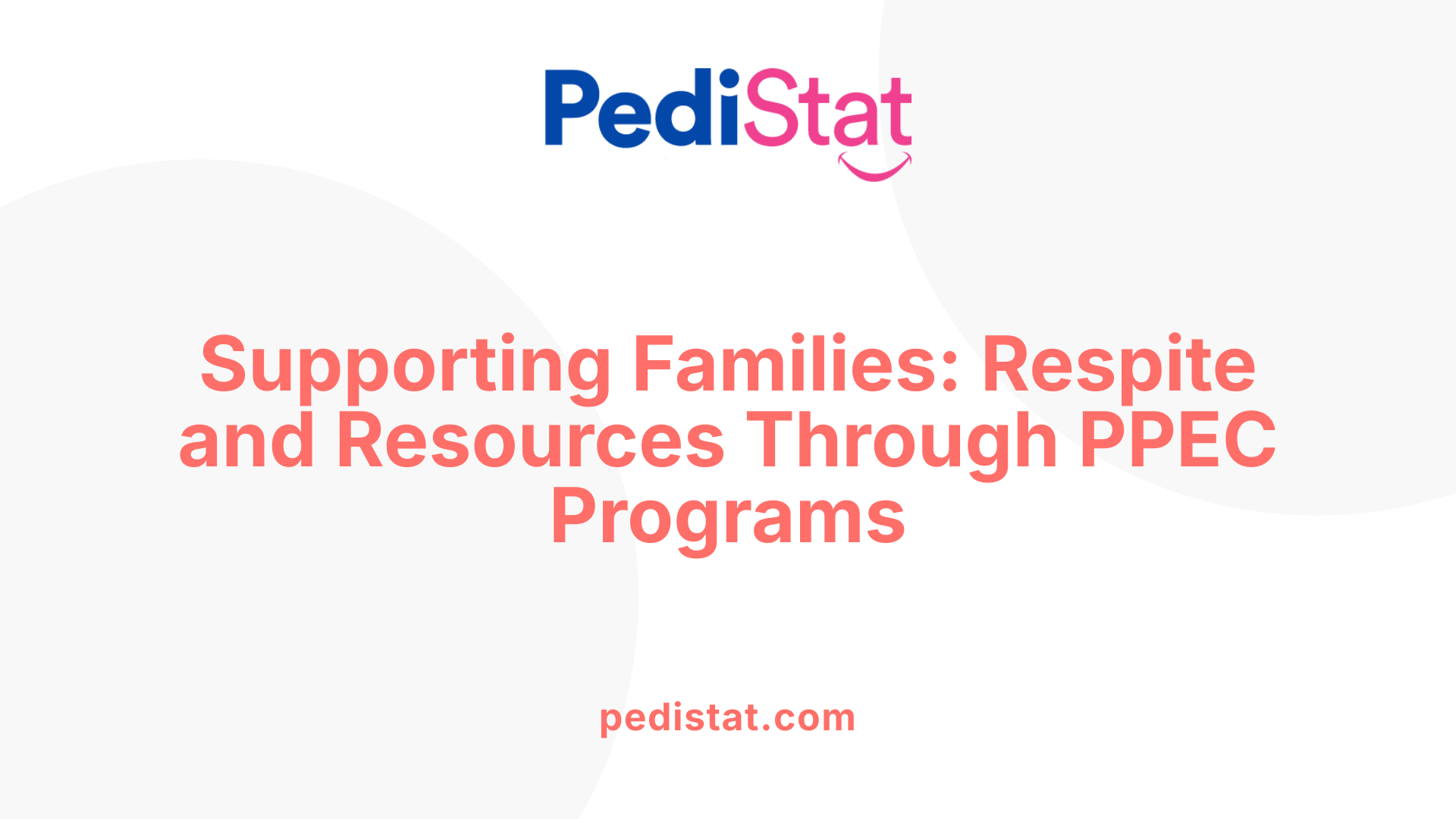How PPEC Programs Work with Pediatricians and Specialists

Introduction to PPEC and Its Collaborative Framework
Prescribed Pediatric Extended Care (PPEC) centers have emerged as a crucial component in the healthcare landscape for medically complex children. These centers not only offer specialized medical care but also serve as a bridge between medical services and familial support, fostering a collaborative environment with pediatricians and specialists. This synergy is essential to provide continuous, tailored care that meets both the medical and developmental needs of children.
The Structure and Purpose of PPEC Programs

What is a PPEC daycare?
A PPEC (Pediatric Extended Care Center) daycare is a specialized facility tailored to children with complex medical needs. These centers operate as medical care environments rather than traditional daycares, providing up to 12 hours of continuous nursing and therapeutic care in a non-residential setting. Staffed with licensed nurses and healthcare professionals, PPECs ensure comprehensive medical supervision for children with conditions such as G-tubes or tracheostomy tubes.
These programs create unique opportunities for socialization, allowing children to interact with peers and participate in developmental activities while receiving essential medical attention.
Role of pediatricians and specialists
The integration of pediatricians and specialists is critical in PPEC programs. Each child benefits from a personalized care plan developed collaboratively with their healthcare team, which may include physicians, therapists, and dietitians. Regular assessments ensure that care remains aligned with medical recommendations, addressing the child's unique health and developmental needs.
Services provided by PPEC
PPEC programs offer a variety of services, including:
| Service Type | Description | Staff Involved |
|---|---|---|
| Skilled Nursing Care | Continuous medical supervision tailored to individual needs. | Registered Nurses, LPNs |
| Developmental Therapies | Occupational, physical, and speech therapy sessions, integrated into daily routines. | Therapists (OT, PT, ST) |
| Nutritional Support | Customized feeding plans for children with dietary requirements. | Dietitians |
| Educational Activities | Structured learning opportunities aligned with individual educational goals. | Certified Educators |
| Social Activities | Peer interaction opportunities to enhance emotional and cognitive development. | All Staff |
PPEC programs not only meet the medical and therapeutic needs of children but also support their educational growth and social development, making them valuable resources for families seeking holistic care solutions.
Enhancing Care Through Multi-Disciplinary Collaboration

How do PPEC programs collaborate with pediatricians and specialists?
PPEC programs facilitate collaboration with pediatricians and specialists through a well-structured, multidisciplinary approach. This team-based model includes a variety of healthcare professionals: licensed nurses, physician assistants, and subspecialty-trained physicians, all focused on addressing the intricate medical needs of children with complex conditions.
Integration of care strategies with pediatrics
PPEC staff coordinate directly with a child’s healthcare team, which includes pediatricians and various specialists, to create comprehensive, personalized care plans. This process ensures that every therapeutic and medical intervention aligns with physician recommendations, thus optimizing care delivery. The PPEC environment provides regular health assessments, allowing for prompt detection of issues or adjustments in care, contributing to enhanced outcomes over time.
Role of specialists in PPEC programs
Specialists play a crucial role in advancing the quality of care in PPEC centers. They contribute knowledge and expertise to develop and implement individualized plans that incorporate these children’s nutritional, developmental, and medical requirements. Incorporating therapies such as speech, occupational, and physical therapy, specialists work collaboratively within the PPEC framework, bridging the gap between medical and developmental needs for a holistic approach to care.
Collaborative Care Model
| Role | Responsibility | Collaboration Example |
|---|---|---|
| Pediatricians | Oversee overall health and give referrals | Regular health assessments and adaptation of care |
| Nurses | Provide daily medical care and monitoring | Administer treatments and communicate with the team |
| Therapists | Address developmental milestones | Implement therapy sessions tailored to individual needs |
| Dietitians | Create personalized nutrition plans | Ensure nutritional support aligned with medical care |
This collaborative and integrated model is essential for ensuring that children with special healthcare needs receive continued, comprehensive support that extends beyond medical interventions, enriching their educational and social development as well.
Transformative Benefits of PPEC Services for Children

What are the benefits provided by PPEC programs for children with complex medical needs?
Pediatric Extended Care Centers (PPEC) provide significant benefits for children with complex medical needs, offering specialized medical daycare and continuous care in a safe, non-residential setting. Licensed nurses and medical professionals staff PPEC centers, ensuring that personalized and comprehensive care is tailored to each child's unique requirements.
The range of support services available at PPECs includes:
- Skilled nursing care: Administered by licensed healthcare professionals, which is essential for managing complex medical conditions.
- Nutritional support: Dietitians create individualized feeding plans to ensure adequate nutritional intake.
- Therapy services: Including occupational, physical, and speech therapy, facilitating improved developmental outcomes.
How do PPEC centers enhance therapeutic programs?
PPEC centers facilitate access to multiple therapy services, increasing the frequency of sessions while promoting better coordination amongst therapists. This integration can enhance therapeutic outcomes significantly. Each child's care plan is developed in collaboration with their healthcare team, making sure that medical and therapeutic needs are cohesively addressed.
What social and developmental benefits do PPEC services provide?
Besides medical care, these centers foster social interactions, allowing children to develop essential social skills in a supportive environment. PPEC programs also serve as a respite for families, accommodating the care needs of children while offering financial accessibility through Medicaid. By bridging medical, educational, and social support, PPEC programs significantly improve the overall quality of life for children and their families.
Roles and Contributions of Healthcare Professionals in PPEC

What roles do healthcare professionals play within PPEC programs?
Healthcare professionals in PPEC (Pediatric Day Health Care) programs play vital roles in ensuring comprehensive care for medically complex children. At these specialized centers, you'll find a diverse team that includes:
- Pediatricians who assess and manage children's health needs, ensuring that their overall development is supported.
- Registered Nurses (RNs) who monitor health, administer medications, and implement nursing care plans tailored to each child's needs.
- Licensed Practical Nurses (LPNs) and nursing assistants who provide everyday care and assist with medical procedures.
- Therapists such as physical, occupational, and speech therapists who focus on developmental therapies, addressing skills essential for growth and daily living.
How are collaborative care plans developed in PPEC?
In PPEC centers, collaborative care is key to managing children's complex needs. Each child receives a personalized care plan, meticulously crafted by:
- Healthcare providers who assess the child’s unique medical, developmental, and nutritional needs.
- Pediatricians who offer medical oversight, ensuring all treatments and interventions align with recommended protocols.
- Therapists and dietitians who contribute their expertise to ensure that therapy and nutrition plans support the child's growth and development.
This ongoing coordination fosters a holistic approach, combining medical care with therapeutic interventions.
What role do pediatricians play in PPEC programs?
Pediatricians are integral to PPEC programs, as they:
- Provide ongoing medical supervision, adjusting care plans based on the child's evolving needs.
- Facilitate communication between the PPEC team and families, reinforcing the collaborative approach to care.
- Coordinate with specialists to manage complex conditions, ensuring that comprehensive health issues are addressed early and effectively.
This close collaboration not only improves health outcomes but also supports families, giving them peace of mind knowing their child is in capable hands.
Family Support and Respite in PPEC Programs

How do PPEC programs support families of medically fragile children?
PPEC programs provide invaluable support for families with medically fragile children. By offering specialized medical daycare, these centers allow children to receive continuous care in a non-residential setting for up to 12 hours a day. This care is delivered by a skilled team of healthcare professionals, including nurses and therapists, ensuring each child’s unique medical and therapeutic needs are comprehensively addressed.
In addition to health care, PPEC fosters essential social interactions among children. By participating in age-appropriate activities, children engage in play and learning that promotes both emotional and social development. This safe environment benefits parents, knowing their children are well-cared for while receiving necessary therapeutic interventions.
Additional services for family support
PPEC centers enhance family support by offering services such as respite care, which allows caregivers a much-needed break from day-to-day caregiving tasks. Families also gain access to educational resources and emotional support systems, ensuring that they are not alone on their journey. The collaboration with local pediatricians strengthens the level of care, providing families with peace of mind and information about managing their child’s health.
Financial accessibility of PPEC services
Financially, PPEC services are often covered by Medicaid, which significantly lowers the out-of-pocket expenses for families facing complex medical challenges. This makes PPEC a cost-effective alternative to traditional home health care or long-term care solutions, promoting greater access for families needing support. With a focus on comprehensive care and affordability, PPEC programs effectively respond to the multifaceted needs of families with children who have special healthcare requirements.
Conclusion on the Pivotal Role of PPEC in Pediatric Care
In conclusion, PPEC programs serve as a critical nexus between healthcare providers and families, enhancing the care of children with complex medical needs through multi-disciplinary collaboration and comprehensive support services. By integrating medical, developmental, and social care, PPECs ensure that children not only receive the medical attention they require but also thrive in a nurturing environment tailored to their individual needs. This model not only alleviates the burden on families but enhances the quality of life for both children and their caregivers, underlining the importance of these centers in the pediatric healthcare ecosystem.
References
- The Role of PPEC in Managing Failure to Thrive - Spark Pediatrics
- The Benefits of PPEC: How It Combines Medical and ...
- The Role of PPEC in Bridging Medical and Educational Needs
- 5 Incredible Benefits of a PPEC
- Prescribed Pediatric Extended Care (PPEC) - Lee Health
- Nursing August 2022: Prescribed Pediatric Extended Care
- Prescribed Pediatric Extended Care (PPEC) FAQ - Lee Health
- Frequently asked questions - Caring Hands PPEC/PDHC
- PPEC Medical Childcare - Easterseals Redwood













